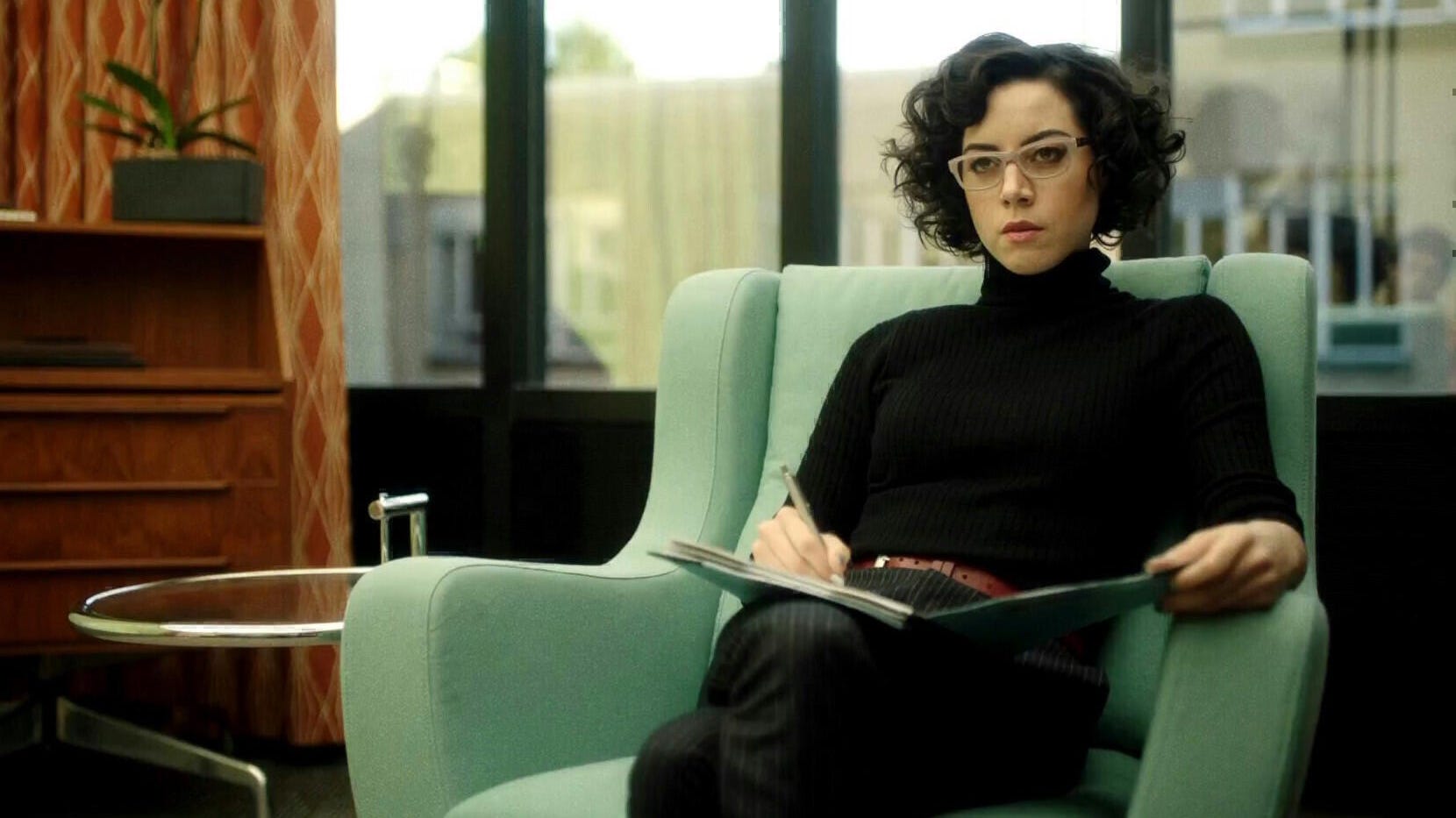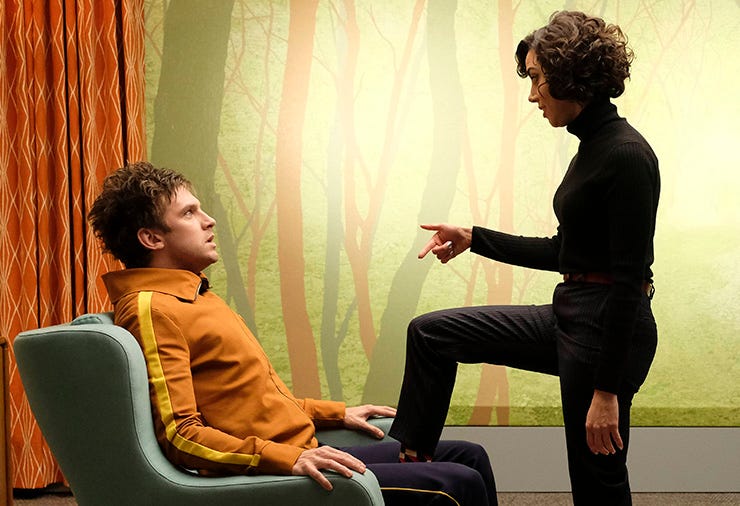
In 2017, Aubrey Plaza Redefined the Supervillain
How the actor took Marvel's most inaccessible villain from caricature to character.
"I've only watched it really one time, and barely," says actor Aubrey Plaza about the most iconic scene in the most unforgettable episode of 2017's most buzzed about comic book adaptation,Legion.
On the phone with TV Guide, Plaza explains that she "doesn't enjoy watching myself so much" or, subsequently, read her own press with any kind of frequency. That might explain why she seems surprised and delighted to be named one of TV Guide's Best Performances of 2017. But it'll come as no surprise to fans of Legion, a trippy, experimental and cinematic origin story of one of the world's most powerful X-Men.
Helmed by Noah Hawley of Fargo fame, what the eclectic cast and crew have created is a show unlike any other superhero offering that's come before it. And a large part of that is due to what Plaza's brought to life as Lenny (aka Faruk, aka The Shadow King, aka The World's Angriest Boy), a comic book villain unlike any that's graced screens before.

"All of Noah's scripts are in some ways literally up for interpretation, and I think that's what's genius about him," says Plaza. "He gives you this beautiful starting point, but it's really up to you to decide, well, how do I act between lines, and how do I move, and what do I look like?" For Plaza, having that much freedom to realize her character was both a blessing and curse. After all, she wasn't playing a staid baddie that cackles, kidnaps the girlfriend, and bungles their own plan by monologuing in front of the captive hero.
Her task was significantly more challenging, in part because of experimental, non-linear format of the show. David Haller (Dan Stevens) seems to be a normal man, albeit one who's been institutionalized in a mental hospital by his sister. But he's not just there because of the visions and voices in his head; he's there because of the the unexplained accidents that happen around him -- which we later find out are his latent psionic abilities kicking into overdrive because because one of those voices in his head is real. David is freed from the institution by people like him, who tell him he has powers, rather than a diagnosis. But that little voice that sounds a lot like his friend Lenny never goes away. That's because Lenny is one of the many terrifying manifestations of a psychic hitchhiker that's been feeding off of David since he was born; it's endgame is to hijack David's unheard of powers for itself. And considering that David's father is Professor X -- a telepath strong enough to find mutants around the world and founder of the legendary X-Men, -- David's one of the most powerful mutants in the world.
The responsibility of portraying that multifaceted, many-faced, mental parasite that grew and evolved as David did fell to Plaza. Rather than an evil and charming baddie (ala Loki from the Marvel movies), Plaza's villain was simultaneously a horrific, haphazard refraction of David's worst fears and the only creature on Earth who understood what it was like for David to be trapped in his own head. But despite the fact that Plaza was playing one of Marvel's most inhuman villains, Lenny is definitively the show's breakout character -- and the one that Legion fans really connected to.

legionfx.tumblr.com / FX
That's partially due to the fact that Plaza had so much to do; there are at least six distinct versions of Lenny depicted in the show. "Lenny can kind of become what she needs to become when she needs to become it," says Plaza. "Every time I would read a new script and I would kind of just decide on my own the version of Lenny that I think I am in that moment." Each version had a specific purpose that served the character's greater mission: if David needed a friend there was mental hospital Lenny, if David needed to be threatened there was terrifying Dr. Lenny Busker, psychologist, and so on. As the season progressed and David became aware of the passenger in his head, Plaza's performance grew infinitely more complex as the many layers of Lenny began to coalesce into an unstoppable force actively threatening to erase David from his own mind.
"For me that was what was most challenging about playing the part, to track all those versions of Lenny that are kind of being manipulated by Faruk [the name of the Legion's villain in comics], but also really keep the real essence of human Lenny underneath of it all." It might seem odd to think of the big bad of Legion -- again, a mental parasite -- as human, but Plaza insists that's the key to character. It's also the main reason audiences were so enthralled with her performance.
"I have to approach my character like I'm really a living, breathing person," says Plaza. "A lot of my character [especially in the beginning of the show] was really so much about the friendship with her and David so a lot of the [character] work I did was exploring what David means to Lenny, the depth of their relationship and their dynamics, so we can understand why she's so important in the context of the whole show."
Empathetically grounding a character that in Plaza's own words is some frankenstein amalgamation of "hallucinations", "memories", "a projection of David's insecurities" that can "kind of jump into these different dimensions" is no small task. Plaza has a secret process, that involves a lot of off-set rehearsals with Dan Stevens (who was unavailable to comment for this story) but says it was mostly about "physically how am I in this scene? Obviously the show is really visual, but [Hawley] wants everything to really be motivated by the characters, so they kind of let us get in there on set and play."

legionfx.tumblr.com / FX
Worrying first and foremost about the physicality of the character helped Plaza differentiate her multiple Lennys and prepare her for pivotal episode, where they converge into what might be Lenny's truest (emotional) form. "Chapter 6" of Legion is remarkable for many reasons, the main one being that we finally see Plaza's character reveal her true intentions to David and make a gutsy move for his psionic abilities. Considering that "Chapter 6" featured a version of Lenny viewers had never seen before -- one who has succeeded in taking control of David's mind -- the stakes were much higher. While the internet reaction focused on the (truly! spectacular!) dance sequence in this episode, the scene that cemented Plaza's status as one of the best performances of the year happens a few scenes later in Dr. Busker and David's one-on-one.
"That scene in particular was probably the hardest scene I've done so far on the show, because I was kind of revealing myself as Faruk, and as many different things in one scene," says Plaza. "That was really the first time that I felt like, wow, this isn't even me talking. I'm a vessel in this moment, I'm all Faruk philosophies here. That to me felt like that was the moment that he really kind of overtook me in that way."
"My focus was to commit fully to that character... Lenny [as Faruk] is just really controlling the situation, manipulating everyone, and she's in power," recalls Plaza. But while many would have chosen to play the scene by going full Faruk-ian horror, Plaza tackled it in a much more subtle, sympathetic way.
"[I thought] maybe if I play her with compassion, and I treat those moments like they're really real and grounded, that maybe that's what the ultimate scariest move, rather than to play it like, 'Oh, I'm a creepy villain that's a puppet master.'" says Plaza. "To me, my approach is always going to be how do I find the human story here, and how do I find compassion for the character, even if she is the villain? And how do I relate to her and understand her on a deeper level?"

Lenny reveals her true intentions to David.
Michelle Faye / FX
What Plaza unearths in that scene is spectacular. Lenny terrifies the ever-living f--ck out of David, using a single anecdote about a fungus that grows inside ant brains only to explode through their skull to pollinate. Spinning out the violent metaphor for love she's painted, Lenny reveals her true motivation: power. Love is nothing, friendship is nothing, happiness is nothing, the only thing that matters is control. But there's one small moment in the dialogue, played with creeptastic tenderness by Plaza, that points to the making of a truly unique villain.
"You're much more powerful than I ever imagined. I figured that I'd just poison you and move on but then I thought our powers together ... man that'll .... a cocktail! S--t! We could give God a run for his money right? But then all this love bullshit, I'm beginning to think I have to go it alone."
By admitting that Lenny would have enjoyed a future with David at one point, not only does Plaza find the humanity of the villain she plays in this scene, she shows that Faruk learned it from his victims. After all, Lenny, as she exists in the many versions that David sees in his head, feels changeable in every way but her purpose. But here is a sign that this entity that only craves total subjugation feels something else, a need for companionship, friendship, and even love -- a drive that didn't exist before experiencing how David interacted with one of the few people in his life that both cared for him and didn't fear him. Though fans knew hardly anything about human Lenny before David -- goaded by Faruk -- accidentally kills her, she permanently changed the worldview of the villain.
Despite being incognizant of this change, it affects Faruk's machinations throughout the entire show. Even after Lenny's climactic scene, she still doesn't try and extinguish David's mind; she simply boxes him away in a dark corner of his brain. Like any human caught up in trying to be happy, the hope that he might change, come around to her side is very present and clear. "[That's] the thing about Lenny that has always been really kind of heartbreaking to me is that she doesn't have ... there's no kind of love in her life," says Plaza.
I have to approach my character like I'm really a living, breathing person.
And while it's unlikely there will be, it's also true that Lenny's need for companionship is now a permanent fixture. As the season winds to a close, Lenny leaps from body to body ending up in Oliver Bird (Jemaine Clement). As they drive off into the sunset, Faruk manifests not as someone from Oliver's life -- like his wife Melanie Bird (Jean Smart) -- but once again as Lenny, dressed in Melanie's clothes.
Faruk will never be a redeemable villain, but Plaza, through Lenny, showed fans how such an inaccessible, grandiose comic book villain can become a character instead of a caricature.
"It's helped me grow a lot, actually, as an actor," says Plaza of her now iconic role. She recalls showing up to set on the first day of shooting and being "really f--king nervous". "Noah was directing that episode, and I didn't audition for the character, so in my mind, I'm like, he doesn't actually really know how I'm going to do this," she continues, the unspoken end of the sentence being what if I f--k this up? Looking back on Season 1, it's pretty safe to that's no longer a concern.
